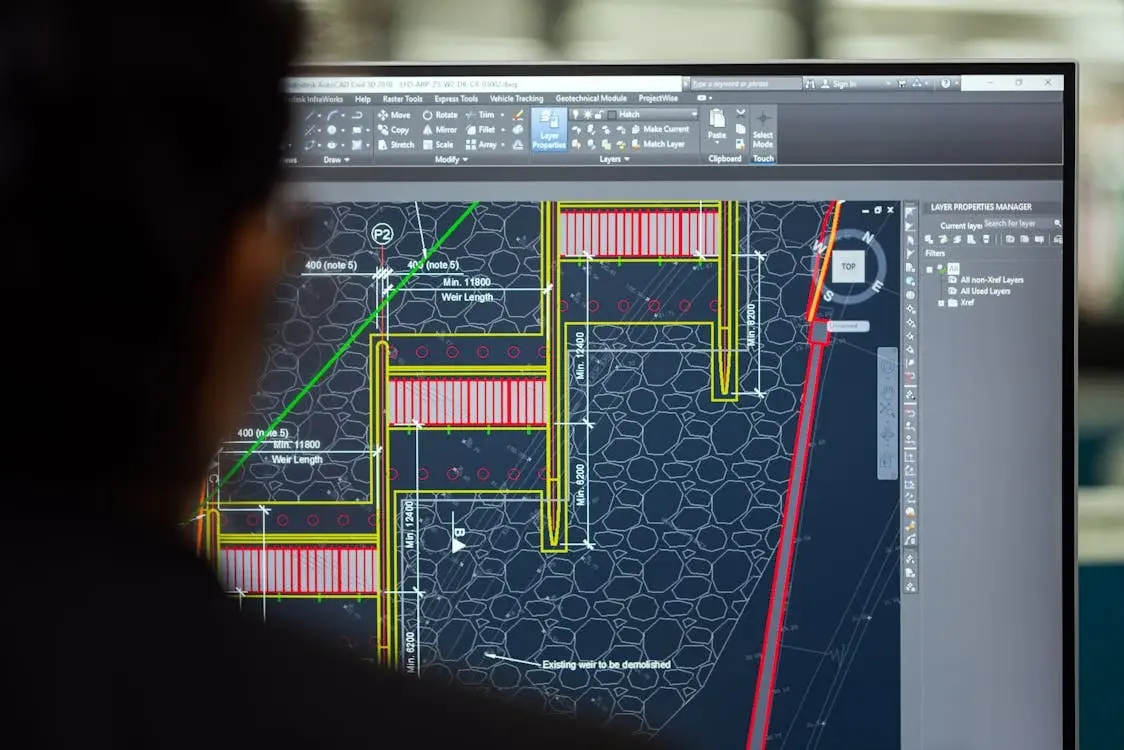
Curious about how much civil engineers make in Georgia in 2026? With expanding roadways, smart infrastructure projects, and rising demand for sustainable construction, the state is a boiling pot for civil engineering talents. From entry-level roles to BIM-focused careers, there are numerous opportunities for professionals to grow and earn competitive salaries.
Let’s explore everything you need to know about civil engineer salary in Georgia, compare city averages, examine specialisation and experience-based pay trends, and share tips to increase your earnings.

Average Salary for Civil Engineers in Georgia 2026
In 2026, the average salary in civil engineering in Georgia ranges from $60,409 to $126,151 per year, influenced by factors like experience, employer type, and project complexity. While this is slightly below the national average of $87,296, Georgia remains a strong market for engineers, thanks to ongoing infrastructure development across urban and suburban areas.
Breakdown by experience level:
- Beginning or Entry level salary for civil engineer: $68,645/year
- Junior civil engineers (5–8 years): $71,446/year
- Senior engineers: $96,607/year
Engineers with BIM expertise, PE or PMP certifications, or experience in smart city or transportation projects typically earn at the higher end of this range.
5 Top Career Path for Civil Engineers in Georgia
Georgia’s infrastructure boom opens doors for both traditional and tech-driven careers. Many professionals now transition into digital roles, especially those involving Building Information Modeling (BIM).
-
BIM Engineer
Advanced tools, such as Revit, AutoCAD Civil 3D, and Navisworks, are used by BIM Engineers to make intelligent 3D models of infrastructure projects. Because of this, surveyors improve planning and help avoid costly mishaps, which is extremely beneficial for current civil projects.
Average base salary in Atlanta, Georgia: $76,000 per annum
-
Structural Engineer
Structural engineers design bridges, buildings, and frameworks to resist both regular use and unusual forces. Because of local earthquakes and weather hazards in Georgia, engineers must be part of construction from start to finish, making their expertise always important.
Average base salary in Georgia: $104,064 per annum
-
Transportation Engineer
Due to quick city growth, there is a growing demand for transportation engineers to plan better roads, bridges, and public transportation. In transportation, they achieve smooth traffic movement and promote public safety by handling DOT projects and urban mobility planning over the long term.
Average base salary in Atlanta, Georgia: $91,000 per annum
-
Environmental Engineer
Determined to be environmentally compliant, these engineers create systems to minimize waste and reduce pollution in construction. Helping with stormwater and green infrastructure, and seeing that projects fit the state and federal environmental rules, is important to them in Georgia.
Average base salary in Georgia: $101,441 annum
-
Geotechnical Engineer
They conduct soil, rock, and underlayer investigation studies to guarantee strong support for construction projects. With Georgia’s different types of landforms, geotechnical engineers are responsible for helping to stop landslides, soil erosion, and building collapses by setting up solid ground supports.
Average base salary in Georgia: $74, 599 per annum
Also Read - What is BIM in Geotechnical Engineering

Average Civil Engineering Salaries Across Cities in Georgia
|
City |
Average Annual Salary |
|
Atlanta |
|
|
Savannah |
|
|
Augusta |
|
|
Marietta |
|
|
Duluth |
|
|
College Park |
|
|
Roswell |
This data provides a helpful comparison of civil engineer salaries across urban and suburban zones in Georgia.
6 Key Factors Affecting Civil Engineer Salary in Georgia
When planning a career or negotiating the salary of a civil engineer in Georgia, understanding what influences the salary can make a big difference. Here are the six most important factors that determine how much you can earn in this field:
-
Employer Type
Where you work matters. Civil engineers employed by private construction firms or multinational consultancies typically earn more than those working in government departments or public sector roles. Private employers often offer better pay, especially for engineers in high-demand specialisations.
-
Specialisation
Your chosen field within civil engineering can significantly affect your earnings. Engineers specialising in Building Information Modelling (BIM), transportation systems, or structural design generally receive higher salaries than generalist civil engineers. Specialised skills often come with increased responsibility and project complexity, which translates to better compensation.
-
Certifications and Education
The more qualifications you have, the more valuable you become. Civil engineers with postgraduate degrees or certifications such as Professional Engineer (PE) or Project Management Professional (PMP) tend to land higher-paying roles.
-
Experience
Like many professions, civil engineering rewards experience. An entry-level engineer in Georgia might start with a modest salary, but with 5–10 years of experience, that figure can double or more.
-
Digital Skills
In today’s tech-driven construction industry, digital skills are highly prized. Proficiency in tools like AutoCAD, Revit, or BIM platforms can set you apart and open doors to higher-paying opportunities. Many employers now seek engineers who can bridge traditional engineering with digital project management.
-
Location
Not all parts of Georgia offer the same salary levels. Engineers working in Atlanta or other urban hubs typically earn more than those in rural or less-developed regions. This is due to the higher cost of living, larger infrastructure budgets, and more complex projects in cities.

Average Salary in Civil Engineering: 5-Year Trends in Georgia
Over the past five years, civil engineering salaries in Georgia have exhibited a steady upward trajectory, influenced by factors such as infrastructure investments, technological advancements, and urban development.
- 2019: The average salary for civil engineers in Georgia was approximately $74,060, driven by ongoing infrastructure projects and urban expansion.
- 2026: The onset of the COVID-19 pandemic led to a temporary slowdown in construction activities, causing a slight dip in average salaries to around $74,710.
- 2026: With the resumption of infrastructure projects and increased demand for sustainable construction, average salaries rebounded to approximately $73,000.
- 2026: The focus on smart city initiatives and green infrastructure contributed to further salary growth, with averages reaching $78,310.
- 2023–2024: The continued emphasis on sustainable and resilient infrastructure, coupled with the adoption of digital tools like Building Information Modeling (BIM), elevated average salaries to $87,296 statewide.
The upward trend in civil engineering salaries in Georgia underscores the state's commitment to infrastructure development and the growing importance of technological proficiency in the field.
Boost Your Salary as a Civil Engineer by Mastering BIM
In today’s competitive AEC industry, standing out as a civil engineer requires more than just a degree. Building Information Modeling (BIM) is transforming how infrastructure projects are designed and executed. By mastering BIM, you not only stay relevant but also open doors to higher-paying roles and faster career growth.
The BIM Advantage:
- Civil engineers with BIM skills are very much in demand, earning over 40% more than the rest.
- Better use of BIM boosts efficiency, makes collaboration far simpler, and helps to achieve superior project results.
How Novatr Helps?
Novatr Offers BIM Professional Course for civil and structural engineers, Novatr’s comprehensive program helps you gain BIM expertise in just 7 months. This course helps you learn about information modeling, parametric structure families, preparing drawings and presenting your designs. It also covers 3D modeling, BIM principles for infrastructure and 4D/5D visualization.
The main focus of this program is on real skills, which involve using the cloud, streamlining BIM techniques, working together and locating clashes. It enables you to use Revit, as well as over 12 other leading building information modeling programs, while following practical methods. Upon the completion of the course, you will be eligible for recognition from Autodesk and Novatr, which can improve your job prospects.
Key USPs:
- Get Dual Certification from Autodesk and Novatr
- Learn Essential BIM Workflows
- 40+ hours of live learning with lifelong access to program content, including multiple RIBA & ISO 19650 Capstone projects.
- Mastering Revit and 10+ BIM software, including Autodesk Revit, Navisworks,
- Construction Cloud, Bluebeam, Tekla & Civil 3D with industry workflows in just 7 months.
- 48% Average CTC Hike: Get placement assistance to land BIM jobs in globally operating AEC firms.
- ISO Verified Project Experience: Practice your skills by working on an international, standard-structured project
- Career Guidance and Placement Support: Prepare for success with guided interviews, portfolio building, and LinkedIn optimization.
- Dedicated Mentor Support: Stay on track throughout with quick query resolution and personalized feedback. Learn from global mentors who are a part of the top 1% AEC companies.
- Weekly live sessions for learning, revision, and practice.
- Professionally built in-house digital platform to elevate your learning experience.
Why Choose Novatr?
- Trusted by Thousands: Join 6,000+ BIM learners from over 45 countries who have successfully graduated from Novatr.
- Expert-Driven Curriculum: Designed through the analysis of 1,000+ job descriptions and rigorously vetted by 200+ global BIM experts.
- Globally Recognized Certifications: Earn certifications from both Autodesk and Novatr, showcasing your verified expertise.
- Proven Career Impact: Learners report an average salary hike of 48% after course completion.
- Loved by BIM Learners: We have a 4.6+ average rating across platforms like Google and Trustpilot.
In a rapidly evolving industry, Novatr stands out as the premier choice for civil engineers looking to master BIM. Enroll today to future-proof your career and unlock unparalleled growth opportunities in the AEC sector.
Next Step
If you want to boost your civil engineer salary in Georgia, future-proof your career with tools like BIM and global-ready certifications. With Novatr’s BIM Professional Course for Civil Engineers, you'll gain the edge you need to climb faster and earn better.
If you are interested in the best BIM practices, visit Novatr and explore the courses listed. For more information on knowledge, ideas and updates, visit our resource page.
Was this content helpful to you



.jpg)







